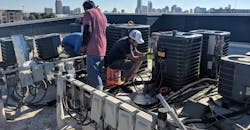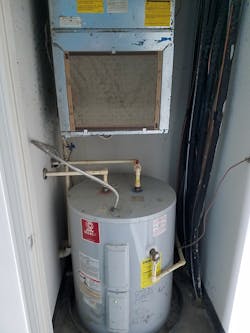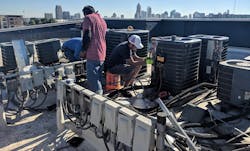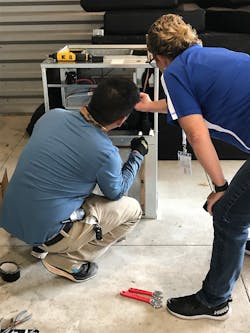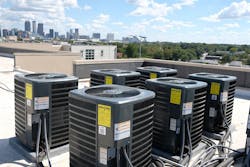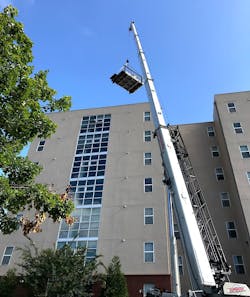Student Housing Upgrades Efficiency, ROI Outside Atlanta
Case Study by Motili, Denver CO
Multi-family buildings and similar facilities like student housing, are always looking for ways to offer an energy-efficient living experience for their residents. The sustainability methods in student housing are becoming more important as today’s student renter is millennial and more environmentally focused than ever before. Savvy community owners and operators know being recognized as green and saving energy can be a competitive advantage in today’s student living complex.
Motili is a real-estate technology company that allows property managers, owners and investors to easily manage repair and replacement projects, with an emphasis in the HVAC space. Motili handles all aspects of an upgrade or replacement project from scheduling to ordering equipment to invoicing, making the company the single point of contact for property owners and operators.
Last fall, the company worked with Denver-based Cardinal Group to complete an energy-efficiency upgrade project at Westmar Lofts, a student housing community located near Georgia Tech in Atlanta. The project consisted of a comprehensive retrofit of the facility’s entire Heating/Ventilation/Air Conditioning (HVAC) system, servicing approximately 400 apartments.
HVAC is a building system where substantial cost savings can be realized. It is a large consumer of energy in the commercial building space, and it follows that an energy-efficient and well-maintained HVAC system can have a dramatic impact on lowering the energy use in a community.
Cardinal Group is a fully-integrated real estate investment, management, construction, development, and marketing firm. It provided asset management services for Westmar Lofts. The complex was working with an energy engineer charged with ensuring the project supported LED lighting, low-flow water fixtures and high-efficiency HVAC systems throughout the complex. Like so many projects, the specs to achieve these installations looked straightforward “on paper” but “on the ground” there were challenges that needed to be overcome to achieve maximum efficiency.
Space and placement of indoor HVAC equipment in closet-like spaces was a challenge at the outset of the project. Motili worked to overcome several significant fitment challenges. For instance, one issue surrounded size constraints on an indoor HVAC unit, as it had been planned out to share an equipment closet with a hot water tank. The problems arose when it was learned that the tank size was out of the scope of the project. After an assessment of potential ways to resolve the issue, it was decided that without reconfiguring or replacing the existing hot water heaters, there was no way to effectively install the energy-efficient 18 SEER HVAC equipment. The sheer size and weight of the proposed 18 SEER equipment made it impossible to install while providing adequate plenum space. The ROI was reevaluated with slightly smaller, lighter, but energy-efficient 16 SEER systems, and the project moved forward.
Motili leverages a nationwide network of contractors, operations teams, and an advanced technology platform, to coordinate work requests. Motili schedules, dispatches, manages and invoices small jobs and large turnkey projects, and uses an asset management platform to improve budgeting accuracy by predicting project equipment failures before they happen.
“Our expertise in turnkey HVAC projects in the multi-family environment, coupled with Daikin and Goodman brand systems, ultimately allowed us to overcome the myriad challenges presented by a project of this scope and scale,” said Motili Vice President Matthew Sallee. “We had to do things that had never been done before to achieve the 16 SEER rating and we accomplished the task. Getting an HVAC redevelopment project to payback under five years is precedent-setting. The Westmar project was a real labor of love for Motili and Goodman and we are proud of what we have accomplished for the company.”
With a project of this scope, there are a host of project management details, including scheduling, resident notifications, and more. Success depends on the ability to generate work orders quickly, communicate efficiently with property management, and do quality work, fast and on budget.
In order to safely install the new systems in the pre-determined locations over the existing water tanks and brittle CPVC waterlines, specialty installation jigs and stands were fabricated. That allowed the technicians to hang the air handlers over the water tanks. This was achieved without disturbing the building’s internal water lines to make the installation proceed smoothly and without any water damage.
The second hurdle to be overcome in the Westmar project was lineset length. In HVAC, there is a challenge in vertical rise relative to where the indoor unit is positioned in relation to the outdoor unit and how many vertical feet they can be separated. High SEER equipment relies on a two-stage system, but its ability to push refrigeration up the vertical rise adds complexity and is not ideal for long-term maintenance and repairs at the facility.
Shannon Jameson, a technical expert at Goodman Manufacturing played a major role in reviewing the tradeoffs of the various efficiency options – both on paper and hands-on, in the field. Many HVAC professionals were consulted, and many doubted the project could or should be done because of the complexity. “Without Shannon’s decades of field expertise, this project would not have been possible,” said Sallee.
Ultimately, the completed Westmar resident unit systems benefited from a highly energy-efficient 16 SEER system, three SEER higher than required by the Georgia Energy Code. This project also qualifies for utility rebates from Georgia Power, so Westmar expects the new HVAC installation to pay back on energy savings in under five years. Typically, HVAC retrofit ROI has a 10-year horizon.
“Motili was able to bring together a turnkey project that exceeded our investment criteria,” said Andrew Ellis, Director of Construction at Cardinal Group. “They delivered on our commitment to bring a sustainable living environment to our communities and valued residents.”
HVAC is a large consumer of energy in the commercial building space, and Westmar installed a Goodman brand high-efficiency heat pump system, rated up to an energy efficient 16 SEER. The higher the SEER number, the more efficient the system operates. Also, the heat pumps are rated at an energy-efficient level of up to 9.5 HSPF. This rating is similar in scale to SEER but measures the efficiency of the heat pump in heating mode.
The existing rooftop HVAC units were replaced with high-performance Daikin brand DCH Rooftop units that serve the corridors and common areas. Additionally, several Daikin brand mini-splits were installed in the elevator rooms to keep equipment at safe operating temperatures.
“Some of the challenges with student housing are that the units are fully occupied — Westmar was at 95% occupancy while this project was in motion,” said Sallee. “With fully occupied units, it was important that any HVAC work did not disrupt the residents. Resident complaints often lead to a lower quality of life and/or satisfaction score, as we see with many multi-family customers. In this scenario, efficient efforts and the professional demeanor of contractors is key. Through the duration of the Westmar project, there were no resident complaints.”
